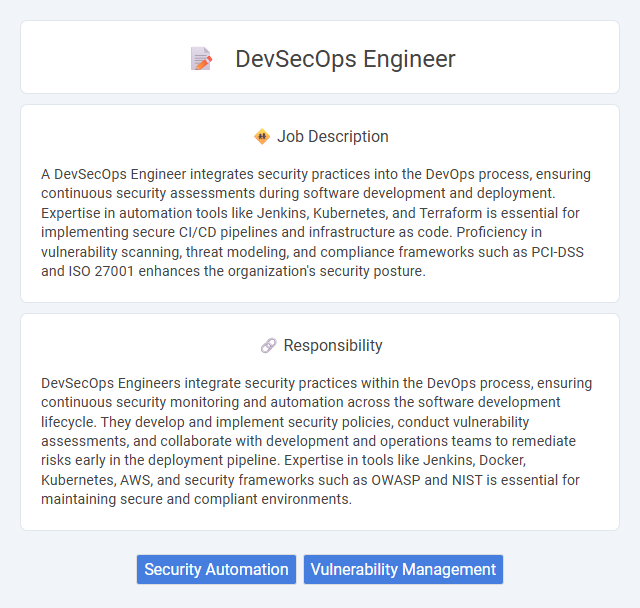
A DevSecOps Engineer integrates security practices into the DevOps process, ensuring continuous security assessments during software development and deployment. Expertise in automation tools like Jenkins, Kubernetes, and Terraform is essential for implementing secure CI/CD pipelines and infrastructure as code. Proficiency in vulnerability scanning, threat modeling, and compliance frameworks such as PCI-DSS and ISO 27001 enhances the organization's security posture.
Individuals with strong problem-solving skills and a passion for cybersecurity are likely to be well-suited for a DevSecOps Engineer role. Those who thrive in fast-paced, collaborative environments and have adaptability to continuously evolving technologies may find this job rewarding. People who prefer routine tasks or limited interaction with development and security teams might face challenges in fitting well within this position.
Qualification
A DevSecOps Engineer requires expertise in cloud platforms such as AWS, Azure, or Google Cloud, combined with proficiency in automation tools like Jenkins, Docker, and Kubernetes. Strong knowledge of security best practices, including vulnerability assessment, threat modeling, and compliance frameworks like NIST and ISO 27001, is essential. Experience in coding languages such as Python, Bash, or Go, alongside continuous integration/continuous deployment (CI/CD) pipelines, ensures seamless integration of security into development workflows.
Responsibility
DevSecOps Engineers integrate security practices within the DevOps process, ensuring continuous security monitoring and automation across the software development lifecycle. They develop and implement security policies, conduct vulnerability assessments, and collaborate with development and operations teams to remediate risks early in the deployment pipeline. Expertise in tools like Jenkins, Docker, Kubernetes, AWS, and security frameworks such as OWASP and NIST is essential for maintaining secure and compliant environments.
Benefit
A DevSecOps Engineer likely enhances an organization's security posture by integrating security practices within the development and operations processes, reducing vulnerabilities early in the software lifecycle. This role probably improves collaboration between development, security, and operations teams, leading to faster, more secure software releases. Companies adopting DevSecOps may experience decreased risk, lower costs related to security incidents, and stronger compliance with regulatory requirements.
Challenge
The role of a DevSecOps Engineer likely involves navigating complex security challenges within fast-paced development cycles, requiring a strong understanding of both development and security principles. They probably face the challenge of integrating automated security measures without slowing down the continuous integration and deployment processes. Balancing the need for robust security while maintaining agility and efficiency is expected to be one of the most demanding aspects of this position.
Career Advancement
A DevSecOps Engineer integrates security practices into the DevOps pipeline, enhancing software development lifecycle efficiency and risk mitigation. Mastery of cloud platforms like AWS, automation tools such as Jenkins, and container technologies like Docker accelerates promotion opportunities to senior DevSecOps or security architect roles. Continuous skill development in CI/CD security, compliance frameworks, and threat modeling significantly boosts career growth prospects in the cybersecurity and software development sectors.
Key Terms
Security Automation
DevSecOps Engineers specialize in integrating security practices directly into the software development lifecycle, emphasizing security automation to detect and remediate vulnerabilities early. They leverage tools like Jenkins, Ansible, and Terraform to automate security testing, compliance checks, and infrastructure as code verification, ensuring continuous security enforcement. Expertise in scripting languages, vulnerability management, and threat modeling enables seamless collaboration between development, operations, and security teams to deliver secure, resilient software at scale.
Vulnerability Management
A DevSecOps Engineer specializing in Vulnerability Management identifies, assesses, and mitigates security risks within the software development lifecycle to ensure robust application protection. They utilize automated scanning tools such as Snyk, Clair, and OWASP Dependency-Check integrated with CI/CD pipelines to detect vulnerabilities early and enforce security policies. Expertise in cloud security frameworks, container security, and compliance standards like NIST and CIS enables proactive threat remediation and continuous vulnerability monitoring across cloud-native and on-premises environments.
 kuljobs.com
kuljobs.com